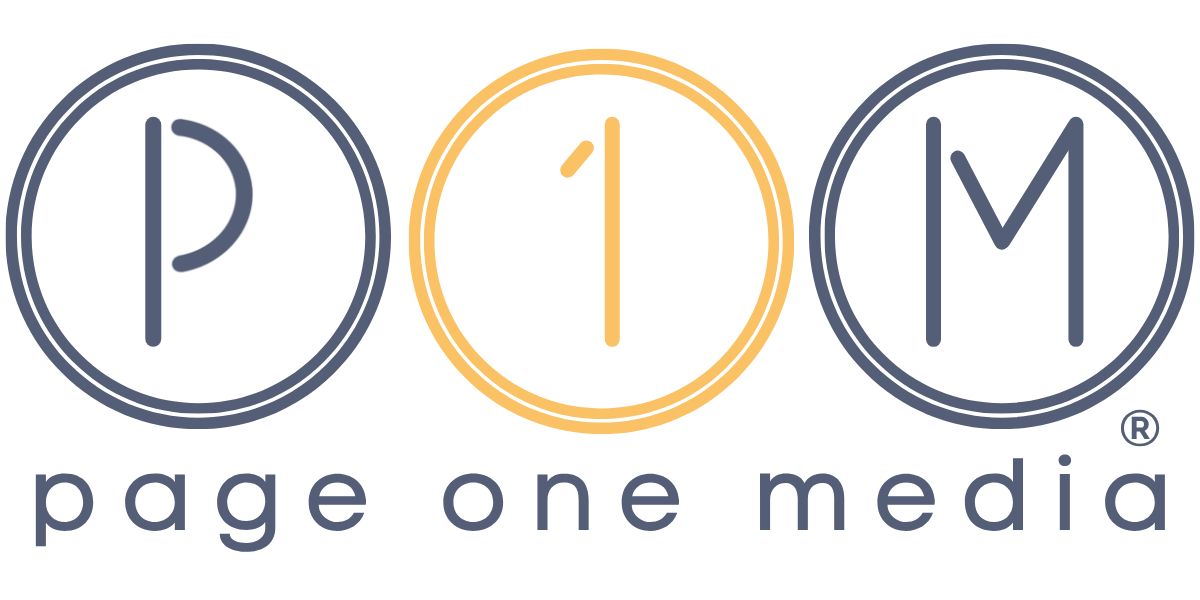
17 May What Every Author Needs to Know Part 3: Publicity and Marketing
There’s been a lot of discussion lately about what publishers do and what they don’t do and what authors can expect, what they can’t expect, and for some reason, what debut authors get that’s different from other authors (which I don’t think is a thing). A lot of ground has been covered but I’d love to talk about what can amount to a wide variation across what an author can expect on the publicity and marketing fronts.
For some background, I’m not going to reference the original newsletter that started all of this hubbub because it is filled with misinformation and we’re not about that at Page One Media. But if you want a really detailed and excellent overview of book publishing sales and statistics, go read Lincoln Michel’s article at Slate. For a briefer overview of what publishers do and don’t do for authors, you can read Michelle Richmond’s Substack on the topic [paywall, but you can learn a lot before you hit the paywall or you can subscribe because she’s doing some good stuff on that Substack].
Okay, so assuming you’ve read these two pieces, we’re going to dive into the haves and the have nots of book publicity and marketing. You can get a whole lot of either one from publishers (both large and small) so don’t make assumptions when some well-placed questions will give you what you need to know.
Let’s Start with the Bad News
There are a number of things that have gone the way of the dodo or at least the golden pheasant.
Many publishers, large and small, aren’t going to send you on a fully paid book tour anymore, especially as an untried author. Travel is expensive, bookshops are very busy and don’t have the marketing budgets to promote events, and unless you can draw a really significant crowd (think 200+, not a few dozen), it’s probably not worth anyone’s time.
You can assume that about one in three people at an event will buy a book. If 120 people come, that’s 40 books sold. Let’s say your book retails for $27.00. Your publisher’s take is $13.50 x 40 books = $540. Did that pay for your flight, hotel, and meals? Depending on where you went, you probably also needed a car rental, a literary escort and/or taxis. Even if you sell five times that amount—200 books—your publisher still only made $2,700. After costs, that is a really meager return on investment, if any return at all.
Why did this change? Ten years ago, your days spent in a city like San Francisco or Los Angeles or New Orleans could very well have been accompanied by some press, local TV and radio, and a feature in the local or regional newspaper. I’m sure you heard about the layoffs at the Los Angeles Times, including those of the whole books team, the San Francisco Chronicle hasn’t had a full-time books editor in years; then, think of the Chicago Tribune, Atlanta Journal Constitution, Philadelphia Inquirer, Miami Herald, and New Orleans Times Picayune—all of these had robust books sections when I got my start in publishing, none of them do anymore.
It’s a mess. If it bothers you too, subscribe to your local newspaper, they need you. On this note, we can talk about print advertising—decimated is the wrong word, what is the inverse of decimate? When nine out of ten are destroyed. Well, this is that. Newsrooms are in big trouble and if you’re a reader or a writer, I highly encourage you to support your local newsrooms, whether they be print, online or National Public Radio. Advertising dollars have rapidly shifted to Google, Meta, Amazon, and other social platforms. They’re targeting abilities are currently unparalleled, but they also compromise your privacy. If this matters to you, you can make choices with your wallet and your donor support. All to say, if a New York Review of Books or New Yorker ad is important to you, you’re probably going to have to buy that yourself. Your publisher may have budget for Google Ads, Amazon merchandizing, or promoted posts on Facebook. That’s a question worth asking, politely: “What’s your digital advertising strategy for books like mine?”
Even digital ads aren’t a great investment for publishers. We can’t direct to one retailer, or the other retailers get upset. Really. And most consumers won’t order from publishers’ websites directly. The more clicks you make a customer go through, the more likely they are to abandon you along the way.
A publisher isn’t likely to create a website for you. That’s on your dime. They won’t submit you for an unlimited number of awards. They won’t build your social media platform for you. And they won’t give you an unlimited number of free copies. Is there anything they will do for me, you ask?
How About Some Good News?
What publicity and marketing can you expect most publishers to invest in?
At least some galleys or ARCs. Since the pandemic, we’ve significantly reduced the number of galleys needed for a campaign, but you can expect almost all publishers to still print some galleys. A digital galley is also something you can expect. Many publishers use either Netgalley or Edelweiss+ to provide e-galleys to media, book buyers (the kind buying for bookstores, not a book consumer), and librarians.
If your book is coming out from a trade publisher, even small ones, you can expect some publicity support. All but the smallest publishers, usually have at least one publicist on staff to conduct outreach to the media. If they don’t have an on-staff publicist, you can ask them what they will do to get media attention for your book. At a medium to large size publishing house, you should expect your book to be assigned a publicist. I’ll stress that—your book—not you will be assigned to a publicist. The press’s job is to garner as much attention as they can for your book so that they can sell copies. You and your book go hand-in-hand, but the in-house publicist is not “your” publicist and doesn’t work for you. You can ask them for things, and I promise you’ll be far more likely to get the things you ask for if they are within the realm of things they can give you, if you are nice to them, and if you are working just as hard as they are to garner attention for your book. It also helps to know who to ask for what. This post explains the difference between publicity and marketing. If you have a publicist and marketer, save them both some time and ask the right person the right question.
Depending on what kind of book you’re publishing, your publisher may do a Goodreads giveaway. Even for a small press, an ebook giveaway via Goodreads is a very affordable way to spread the word about your book. It works best for fiction, across genres, memoir, and lighter nonfiction topics or issues people are passionate about. It’s important to trust your publisher here. A poorly thought out Goodreads campaign, can stop a book before it even gets off the ground.
Hopefully, at least a little Amazon merchandizing is in the budget. It’s a very effective way to spend ad dollars even if we all feel terrible about feeding the beast. If your publisher has a blog, they may publish an excerpt there or Q&A with you. If you see that they do that kind of thing and no one has asked you yet, you should ask about it. If your publisher has social media accounts, they may feature your book there. Ask them how they choose which books are featured and if yours will be included. They may also provide you with banners for your social media accounts featuring your book jacket and a blurb. If you’re touring yourself, they may be willing to create some assets for you to share on social media. They may conduct big mouth outreach to people who can give your book a boost within their networks or on their social media. If they have a book influencer program, they may offer your book to those influencers. Those are a lot of potential things.
But let’s run through some of the most important and time consuming things publicists and marketers do for the books they’re working on:
-
-
-
- Marketers set up the metadata to flow out to retailers.
- They write copy that helps sell your book.
- They create a page on their website for your book.
- They create a digital catalog for each season.
- They create all of the materials and publicity and marketing plans for sales conference.
- They educate and inform the sales force so they can go out to bookstores and sell your book.
- They upload digital galleys/ARCs to the platforms they use for galley distribution.
- They take meetings with the media to pitch your book and the whole list.
- They build media lists and write press materials.
- They fix problems with data.
- They add blurbs and review quotes to the computer system they use that flows data out to accounts (this is done consistently for months and sometimes years).
- They may take your book to appropriate conferences depending on its subject.
- They run backlist promotions.
- They may produce backlist catalogs.
- They may conduct academic marketing for course adoptions depending on your book’s subject.
- They will submit for appropriate awards (sometimes this sits with another department).
-
-
That’s a lot of things. It’s also a phenomenal amount of work when you spread it across dozens or even hundreds of books, depending on the publisher and the number of staff they have. So, if you publish via a hybrid publisher or if you self-publish, it may seem like you can do it all yourself—and there are plenty of things you can do yourself—but there are also things that a publisher is going to be able to do far better.
Sarah Russo is the founder of Page One Media and a publishing professional for over twenty years. You can connect with her on BlueSky @sarahrusso.bsky.social, Instagram, and LinkedIn. You can follow the work of Page One Media on LinkedIn, @pageonem.bsky.social on BlueSky and @pageonem on Instagram

